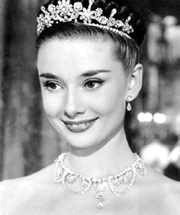 From Princess Anne in "Roman Holiday" to Eliza Doolittle in "My Fair Lady," Audrey Hepburn seemed the epitome1 of inner calm and self-reliance.
From Princess Anne in "Roman Holiday" to Eliza Doolittle in "My Fair Lady," Audrey Hepburn seemed the epitome1 of inner calm and self-reliance.
But to her son, she was a woman beset2 with sadness and self-doubt.
"She remembered vividly3 the fear she felt as a child when the German troops invaded the city of Arnhem, in the Netherlands, where she spent most of the war," writes Sean Hepburn Ferrer in his new book, "Audrey Hepburn, an Elegant Spirit."
"She also told us about how her brothers ate dog biscuits when there was nothing else to eat .... how the bread was green because the only flour available was made from peas. She spent the whole day in bed reading so as not to feel the hunger."
Hepburn also suffered the loss of her father - not from the war, but by desertion. He left the family when war was declared, and she didn't see him until 20 years later, when she was an international movie star.
Sean Ferrer, the only son of Audrey Hepburn and Mel Ferrer, was interviewed at the offices of the Audrey Hepburn Children's Fund in a venerable building a mile from the Pacific Ocean in Santa Monica.
The fund is virtually a one-man operation that stages exhibits and events to benefit UNICEF, to which Hepburn devoted4 her final years. Her son's proceeds from the book go to the fund.
About his mother's sadness, Ferrer commented: "I believe that you can't know courage without conquering fear, and you can't really know joy without knowing sadness."
He explained the "screenplay" that was his mother's life was divided into three acts: 1. pursuing a highly successful film career; 2. raising her two sons (she has a son from her marriage to Italian psychiatrist5 Andrea Dotti); 3. devoting herself to UNICEF after the sons became adults.
"I think that emotional marks are made early on," Ferrer said. "Even if you can rationalize them as you grow up, they still leave that dank sadness you can never truly shake.
"That's why she believed that one of the priorities in our society should be to address the children who are in need. Not just for a cup of soup or another vitamin, but to see what war does to children and protect them as much emotionally as we should physically6."
Sean Ferrer is a tall, husky 43-year-old whose dark hair bears the beginnings of gray. His own professional life is divided among conducting the work of the Audrey Hepburn Children's Fund, managing his mother's legacy7 and pursuing his own career in films.
Having grown up in the movie world, Ferrer entered the field not as an actor but in production. His efforts to produce his own movies have been unsuccessful, mainly, he said, because he refuses to appeal to commercial mediocrity.
Ferrer had just returned from a book signing tour that took him to New York, Boston and Chicago. Like his parents, he had to answer the same questions over and over again - such as, Why write the book now, a decade after his mother's death?
"I didn't write the book now," he explained. "I started thinking about it shortly after my mother passed away. I didn't know if it was going to be a book, but I wanted to sit down and write about this time in my life for my children."
(Agencies)
 收听单词发音
收听单词发音 
